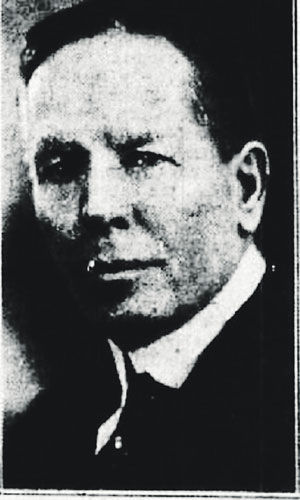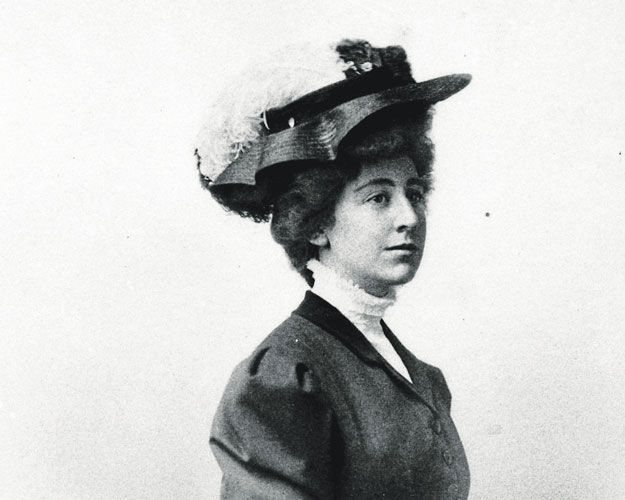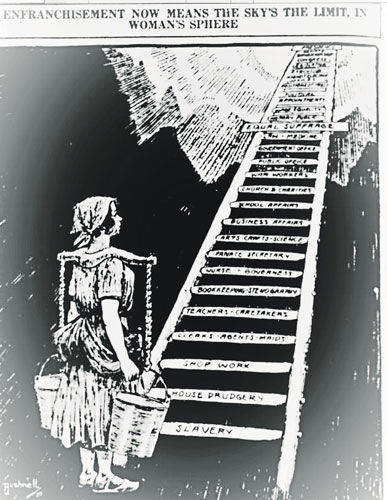Editor’s note: In honor of the 100th anniversary of women’s suffrage, the Telegraph Herald will be publishing a series of articles about how the groundbreaking 19th Amendment impacted the tri-states, as well as some of the key residents involved. This is part three of our series. Look for our next installment on Tuesday, June 9.
By the late 19th and early 20th century, the issue of women’s suffrage was in full swing not only in Dubuque but also throughout Iowa and the nation.
Anna Bell Lawther, returning to live in her hometown of Dubuque since her college years, embraced the political firestorm. She would support causes throughout her life.
“She was not only a suffragist, but educational rights were huge for her,” Sydney Reilly said. “Later on, there was a school associated with Hillcrest Services that was called the Anna Bell Lawther Academy. Education was very important to her.”
Reilly, a recent Loras College graduate, majored in history and minored in sociology and gender studies. She has been an assistant archivist at the Dubuque Center for History since her junior year.
Along with Loras junior and fellow history major Amelia Foley, she has been researching the subject in preparation for a 100th anniversary exhibit that was slated to open at the college in March. The project has been postponed until later this year.
By 1894, six states, including Iowa, had granted women the right to vote on bond and municipal issues but not in any election where candidates were involved. Kansas, Montana, Louisiana, New York and Michigan were the others that joined Iowa in partial suffrage.
Montana would lead the states in enfranchising women, giving them full suffrage in 1914. Two years later, the state elected Jeanette Rankin to the U.S. House of Representatives, the first woman in the country elected to such a position.
Around the turn of the century, however, it continued to be a battle. More often than not, the weapons were simply words. But as has often been proven throughout history, words have the power to persuade, to enlighten and to create change.
Through speeches, editorials and pamphlets, the women and men who felt strongly one way or the other about the suffrage issue used their verbal and writing prowess to persuade others that women had earned and deserved the right to vote — or not.
“There were a lot of people, men and women, against giving women the vote,” Reilly said. “The anti-suffrage sentiment was that women were considered pious and domestic. That they were submissive.”
There was divisiveness even within the movement, with some anti-suffragists saying women didn’t need to vote since their husbands already did, while others believed a woman’s intellect fell short of being able to make decisions about important issues.
“There were people who felt women could just tell their husbands how to vote,” Reilly said. “So, there was no need for them to go to the polls.”
Woman’s suffrage was not off-limits anywhere, including in the religious sector. Reilly said many religious officials often spoke from the pulpit about women wanting the right to vote.
“There was a Bishop Doling who said he supported women’s suffrage,” Reilly said. “He spoke about it on Mother’s Day, comparing Mary and how she took care of Jesus and had his ear, saying women were intelligent enough to make these decisions.”
Doling served on the advisory board of the Dubuque Equal Suffrage Association.
On the other side of the issue, Archbishop James Keane did not feel the same way his colleague did.
“He thought the women fighting for this right were deteriorating their characters and their power as women,” Reilly said.
Charles McLean was an example of an anti-suffragist who simply didn’t think women were smart enough to vote. McLean worked as a reporter for the Dubuque Herald and as an editorial writer for the Dubuque Times-Journal. He left the newspaper business to become a publicist, and one of his first clients was a group opposed to women’s rights. He served as president of the Dubuque Chamber of Commerce and vice president of the Carnegie-Stout Public Library board.
During a visit to South Dakota, McLean spoke to a group about the anti-suffrage movement and the loose morals, low intellect and abnormal characters of the women who supported the cause. In the audience was a member of the South Dakota Equal Suffrage Association, known only by Mrs. Pyle, who was so appalled by McLean’s words that she wrote a letter to the Dubuque Equal Suffrage Association. The president of the association, Lawther, took the complaint seriously.
Lawther wrote to Mrs. Pyle, apologizing for the offensive speech of McLean. Still feeling bad about the impression left by McLean in South Dakota, she and the Dubuque County Equal Suffrage Association raised $125, the equivalent of more than $2,900 today, and sent it to the South Dakota chapter.
Lawther, the first woman to serve on the Iowa Board of Education, described herself as “The Old Lady of Dubuque.” During World War I, she organized activities to help promote Liberty Loans, war savings stamps and the Red Cross. She served on the Iowa Food Administration board and on the Red Cross Congressional Committee.
Lawther would continue to work in politics, entering the race for state auditor as a Democratic nominee in 1928. Although she lost the election, she garnered more votes than most of the men on the Democratic ticket.
It was a sign of the times: The political arena wasn’t just for men.
















